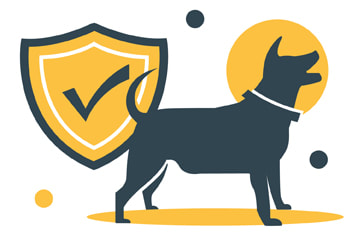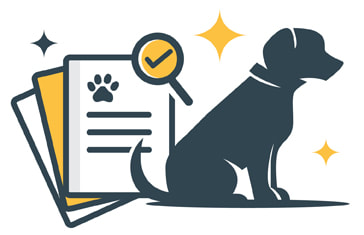Buying a Puppy in New Zealand - Everything You Need to Know
Our guide covers the most popular places to buy a puppy, benefits, drawbacks, costs and breeder must-know facts, supplies and essentials a puppy needs and frequently asked questions to help you make an informed choice.
Updated 9 February 2024
Summary:
To help you plan with confidence, our guide covers:
Know This First - Puppy Costs: The puppy cost can vary widely depending on the breed, age, and location. For example, the upfront cost to buy purebred puppies may cost anywhere from $800 to $3,000, while mixed-breed puppies may cost less. Therefore, it's important to research and compare prices from different breeders and sources to ensure you're getting a fair price.
Before getting to the stage of finding and buying a puppy, there are a few things you should know and consider before starting your search:
It's important to research different breeds and choose one suitable for your lifestyle and living situation. Consider the size, energy level, grooming needs, and health issues. If, after reading all this, you're still keen to get a puppy, read on to understand the best way to buy a puppy in New Zealand. If you're still unsure about getting a puppy, we've built out a definitive guide to help understand the pros and cons of getting a puppy.
- If you're considering buying a puppy, our guide tackles the critical topics every potential dog owner should consider - from the benefits and challenges of raising a puppy to the financial implications that come with this furry addition to your family.
- We outline the most popular places to find your future pet, providing a window into the costs and credentials of reputable breeders. We also explain the costs of puppy ownership, financing options and the long-term financial commitment required.
- Understanding the prerequisites of responsible ownership is crucial, and our guide lays out the must-know facts and considerations before you decide to buy a puppy.
- Suggested reading: The SPCA's guide to bringing a puppy home is an excellent starting point and a helpful resource we suggest bookmarking.
- Are you considering pet insurance for a puppy? Our video below walks you through our guide to help you make a decision about whether or not you want or need pet insurance.
To help you plan with confidence, our guide covers:
- Where are the Most Popular Places to Buy a Puppy in New Zealand?
- Getting a Puppy - Benefits & Drawbacks, Costs and Breeders
- What's the Best Way to Finance a Puppy Purchase?
- Must-Know Facts and Considerations Before Buying a Puppy
- Supplies, Costs and Essentials a Puppy Needs
- Frequently Asked Questions
Know This First - Puppy Costs: The puppy cost can vary widely depending on the breed, age, and location. For example, the upfront cost to buy purebred puppies may cost anywhere from $800 to $3,000, while mixed-breed puppies may cost less. Therefore, it's important to research and compare prices from different breeders and sources to ensure you're getting a fair price.
Before getting to the stage of finding and buying a puppy, there are a few things you should know and consider before starting your search:
- Puppies require a significant amount of time and energy for training and socialisation.
- Puppies may have accidents in the house and may exhibit unwanted behaviours such as chewing, barking, and digging.
- Puppies require vaccinations, spaying or neutering, and other medical procedures, which can be expensive.
- Are you ready for the time and financial commitment that comes with dog ownership? Dogs are expensive to keep, and the cost should not be underestimated.
- Do you have the space and resources to care for a dog?
- Do you have any allergies or other health concerns that may be affected by a dog?
It's important to research different breeds and choose one suitable for your lifestyle and living situation. Consider the size, energy level, grooming needs, and health issues. If, after reading all this, you're still keen to get a puppy, read on to understand the best way to buy a puppy in New Zealand. If you're still unsure about getting a puppy, we've built out a definitive guide to help understand the pros and cons of getting a puppy.
MoneyHub Founder Christopher Walsh shares his puppy experience and the true costs of owning a dog:
|
"Reflecting on my journey into dog ownership reminds me of the significant, often underestimated responsibilities that come with the excitement of a new puppy. As a teenager, my eagerness to have a dog was boundless, and my promises to care for one were earnest. But the reality was that my parents carried the load, as many parents do, despite their children's best intentions. It was the same with our neighbours, and it's a reality that families rarely escape.
When it comes to holidays, you're suddenly factoring in pet-friendly accommodations or the trustworthy services of kennels. Training your pup is a sporadic activity and a structured, ongoing commitment. Ensuring their safety, with measures like secure fencing, becomes a part of your daily life. The financial and time investment in a dog goes far beyond the initial purchase. The recurring costs of healthcare, nutrition, and grooming accumulate significantly over time. These planned expenses don't include unforeseen emergencies, illnesses, or accidents that can happen at any time. Pet insurance isn't cheap; for many, it's unaffordable. Even dog food has become expensive and a struggle for some New Zealanders. Throughout 2023 we saw visitors to our pet insurance comparison drop as far fewer New Zealanders contemplated buying a cat or dog due to the increasing cost of living. Before you're captivated by the prospect of a new puppy, you must equip yourself with comprehensive knowledge. We've published this guide to help you make an informed decision. We also suggest you read it alongside resources like the SPCA's advice and ensure you're fully prepared for the enduring commitment of dog ownership. Bringing a puppy into your life is an irreversible decision that should be made carefully, considering all the ongoing obligations and the joy it will bring". |
Christopher Walsh
MoneyHub Founder |
Where are the Most Popular Places to Buy a Puppy in New Zealand?
There are several popular places to buy a puppy, including:
1. Breeders
You can find a list of registered breeders on Dogs New Zealand (formerly the New Zealand Kennel Club). It's important to choose a reputable breeder who follows good breeding practices and takes care of the health and welfare of their puppies.
2. Animal shelters
Animal shelters and rescue organisations often have puppies available for adoption. Adopting a puppy from a shelter can be a rewarding way to give a home to a deserving animal, and it often costs less than buying a puppy from a breeder.
3. Online platforms
You can find puppies for sale on online platforms such as TradeMe and Facebook Marketplace. However, it's important to be cautious when buying a puppy online and to thoroughly research the seller to ensure you're getting healthy and well-cared-for animals.
What's the difference between adopting and buying a puppy?
The main difference between adopting and buying a puppy is where the puppy comes from. When you adopt a puppy, you take in an animal rescued from a shelter or rescue organisation. When you buy a puppy, you're purchasing the puppy from a breeder or other source.
Adopting a puppy can be a rewarding way to give a home to a deserving animal, and it often costs less than buying a puppy from a breeder. However, it's important to know that adopted puppies may have unknown histories and require extra training and socialisation to reach their full potential.
Buying a puppy from a reputable breeder can give you more control over its health and breed history, but it may be more expensive. Adopting a rescue animal may not offer the same sense of fulfilment.
Adopting a puppy can be a rewarding way to give a home to a deserving animal, and it often costs less than buying a puppy from a breeder. However, it's important to know that adopted puppies may have unknown histories and require extra training and socialisation to reach their full potential.
Buying a puppy from a reputable breeder can give you more control over its health and breed history, but it may be more expensive. Adopting a rescue animal may not offer the same sense of fulfilment.
Get Pet Insurance Quotes With Our Top Insurers
|
Our pet insurance research highlighted a shortlist of price and value-leading pet insurers.
|
Christopher Walsh
MoneyHub Founder |
Getting a Puppy - Benefits & Drawbacks, Costs and Breeders
Benefits
There are many benefits to getting a puppy. Here are just a few:
There are many benefits to getting a puppy. Here are just a few:
- Companionship: Puppies make great companions and can bring joy and happiness to your life.
- Loyalty: Puppies are loyal animals and can form strong bonds with their owners.
- Exercise: Owning a puppy can encourage you to exercise more, as you'll need to take your puppy for walks and play with them regularly.
- Training: Puppies are easier to train than adult dogs, as they're more receptive to learning and have more flexible minds.
- Customisation: When you get a puppy, you can shape its personality and behaviours through training and socialisation.
Drawbacks
While there are many benefits to getting a puppy, it's important to be aware of the potential drawbacks. Here are a few things to consider:
While there are many benefits to getting a puppy, it's important to be aware of the potential drawbacks. Here are a few things to consider:
- Time commitment: Puppies require a significant amount of time and attention. They need to be fed, exercised, and trained regularly.
- Training and behaviour issues: Puppies can be difficult to house-train and may exhibit unwanted behaviours such as chewing, barking, and digging.
- Medical expenses: Puppies may require vaccinations, spaying or neutering, and other medical procedures, which can be expensive.
- Accidents: Puppies, especially young ones, tend to have accidents in the house.
Which puppy breeds are the most popular amongst puppy breeders in New Zealand?
There are many reputable puppy breeders in New Zealand, including commercial and hobby breeders. Some popular breeds that puppy breeders often breed include:
- Labradors
- Golden Retrievers
- German Shepherds
- Staffordshire Bull Terriers
What are the cheapest breeds of puppies?
The cost of a puppy can vary widely depending on several factors, including the breed, age, and location. Generally, smaller breeds tend to be cheaper than larger breeds, and purebred puppies may be more expensive than mixed-breed puppies. Some examples of cheaper breeds of puppies include:
It's important to note that the initial cost of a puppy is just one part of the overall financial commitment of dog ownership. You should also factor in the ongoing costs of food, veterinary care, and grooming.
- Jack Russells
- Basset Hounds
- Beagles
- Cocker Spaniels
- Greyhounds
- Pugs
- Shih Tzus
It's important to note that the initial cost of a puppy is just one part of the overall financial commitment of dog ownership. You should also factor in the ongoing costs of food, veterinary care, and grooming.
What are the most expensive breeds of puppies?
As with the cheapest breeds, the cost of the most expensive breeds of puppies can vary depending on factors such as breed, age, and location. However, some breeds that are generally more expensive include:
Again, it's important to consider the overall financial commitment of dog ownership rather than just the initial cost of the puppy.
- Bulldogs
- French Bulldogs
- Pomeranians
- Samoyeds
- Siberian Huskies
- Standard Poodles
Again, it's important to consider the overall financial commitment of dog ownership rather than just the initial cost of the puppy.
Is it safe to buy puppies on TradeMe or Facebook Marketplace?
While it's possible to find puppies for sale on online platforms like TradeMe and Facebook Marketplace, it's important to be cautious when buying a puppy online. There are several risks to consider, including the possibility of buying a sick or poorly bred puppy or falling victim to a puppy scam.
To minimise these risks, it's important to thoroughly research the seller and ask for references, visit the breeding facility in person if possible, and ask for proof of the puppy's health and breed history. It's also a good idea to consider adopting a puppy from a reputable animal shelter or organisation instead.
To minimise these risks, it's important to thoroughly research the seller and ask for references, visit the breeding facility in person if possible, and ask for proof of the puppy's health and breed history. It's also a good idea to consider adopting a puppy from a reputable animal shelter or organisation instead.
How do I avoid scams when buying a puppy?
There are a few key steps you can take to avoid getting scammed when buying a puppy:
- Research the seller and ask for references.
- Visit the breeding facility in person if possible.
- Ask for proof of the puppy's health and breed history.
- Be cautious of sellers unwilling to provide information or allow you to see the puppy in person.
- Don't transfer money or send payment without seeing the puppy first.
- Consider adopting a puppy from a reputable animal shelter or rescue organisation instead.
What's the Best Way to Finance a Puppy Purchase?
The best way to finance a puppy purchase will depend on your financial situation and the cost of the puppy. Some options to consider include the following:
- Saving up in advance: If you have the time and resources, saving up in advance can help you pay for a puppy outright and avoid taking on debt.
- Credit card: If you have a good credit score and can pay off the balance promptly, using a credit card may be a convenient way to finance a puppy purchase. However, using your credit card to buy a puppy is not recommended if you're likely to incur significant interest expenses.
- Personal loan: If you have good credit, a loan from a bank or other lender may be an option for financing a puppy purchase. It's important to compare rates and terms from different lenders to find the best deal. But, like buying a puppy on a credit card, be mindful of the interest expense you'll incur. Generally, you should only take out a personal loan to buy a puppy if the rate is low and you can stay on top of the payment schedule.
- Payment plan with the breeder: Some breeders may offer payment plans or financing options to help make the puppy cost more manageable. Be sure to carefully review the terms and conditions of any payment plan to ensure it's a good fit for your needs.
Must-Know Facts and Considerations Before Buying a Puppy
There is nothing more exciting and overwhelming than bringing home a new puppy. While you likely fell in love with his/her little face at the shelter or breeder’s, there is a lot you must know before bringing your new puppy home.
1. Set up an area just for your puppy
2. Puppy proof your home
3. Puppies have a lot of energy
4. Wean your puppy onto your desired food
5. Potty training is tough
6. Don’t leave water down all night
7. Get puppy training
8. Groom your dog early
9. Get your puppy checked right away
1. Set up an area just for your puppy
- It’s natural for everyone to want to be in the puppy’s face and playing with him/her all day, but puppies need their rest and alone time too. Set up an area that’s just for your puppy so he/she knows that’s a safe area.
- Decide how you want to give your puppy quiet time, whether it’s in a crate, on a bed, or on a blanket. Fill the area with things your puppy needs like a toy to cuddle, water, and a comfortable, quiet place to lay.
2. Puppy proof your home
- Puppies are curious, so you’ll need to puppy-proof your home to keep him/her safe. Invest in dog gates to section off areas of your home your puppy shouldn’t go, including at the top and bottom of your staircases.
- Also, tie up any loose cords, remove any toxic plants, and cover up any furniture or other objects your puppy may turn into a chew toy.
3. Puppies have a lot of energy
- Make sure you have a lot of time to play with your puppy and walk him/her a couple of times a day. When you first bring your puppy home it may feel like he/she will never sleep. But with plenty of exercise and stimulation, he/she will.
- Invest in balls small enough (but not too small) for your puppy to pick up and play fetch, along with other interactive toys. Consider buying chew toys too that are safe for his/her teething mouth but don’t pose a choking hazard.
- Walk your dog at least twice a day. At first, it will be only for a short distance, possibly to the neighbor’s house and back, but with practice, you’ll build up to longer walks.
4. Wean your puppy onto your desired food
- Shelters and breeders will have your puppy on a specific food. If it’s not what you want to feed him/her, wean the puppy off the food slowly. Start with a mix of 80% original food and 20% new food. Give your puppy a few days to get used to it.
- Slowly work into a larger portion of new food and less old food over 2 weeks. Eventually, you’ll transition 100% to the new food, but the slow transition will allow your puppy’s digestive tract to adjust and won’t leave you with unpleasant bathroom surprises.
5. Potty training is tough
- There’s no getting around it, potty training is tough. It takes a lot of time and patience. Initially, you’ll be taking your puppy out every 30 minutes. Set a timer and take him/her out even if it doesn’t seem like he/she needs to go.
- When your puppy goes potty, give positive reinforcement and even use small training treats. With enough practice, he/she will catch on and be able to tell you when he/she needs to use the bathroom. Some puppies catch on in a week or two and others take a few months, so have patience.
6. Don’t leave water down all night
- When your puppy is young, don’t leave the water out all night. As you toilet train, you should restrict water starting around 7pm until you wake up. Your puppy will have an easier time getting through the night without accidents and you’ll get more sleep.
7. Get puppy training
- Training a puppy takes a lot of patience and some skill. Even if you consider yourself the ‘dog whisperer’ invest in training. A good trainer can help you socialise your dog, curb any behavioural issues, and help you enjoy the many wonderful years you’ll have with your dog.
- Our guide to puppy training schools in Auckland, Hamilton, Wellington and Christchurch outlines what you need to know and the best trainers.
8. Groom your dog early
- Dogs need a lot of grooming, some of which you can do yourself. Get your dog used to be poked and prodded early in his puppy years so he/she gets used to it. At a minimum trim his nails, clean his ears and brush his teeth. Let him see that you can be gentle and he can relax while getting groomed.
- This will also help when it’s time for vet visits. Your pet will be more comfortable with poking and prodding and won’t get so anxious when it’s time for the doctor.
9. Get your puppy checked right away
- It’s important to have your puppy checked out right away. Even if he/she was already desexed and has the necessary vaccinations. Getting checked right away will ensure the puppy is healthy, doesn’t need any treatments, and will help you and your puppy establish a relationship with a local vet.
Get Pet Insurance Quotes With Our Top Insurers
|
Our pet insurance research highlighted a shortlist of price and value-leading pet insurers.
|
Christopher Walsh
MoneyHub Founder |
Supplies, Costs and Essentials a Puppy Needs
Puppies, like babies, need a lot of supplies. The more prepared you are to bring your puppy home, the easier it will be to care for him/her. Consider purchasing these essentials before bringing your puppy home.
Other Important Essentials
The supplies above are the minimum of what you need to bring a new puppy home, but there are other important essentials you should consider:
Budgeting for a New Puppy
Every puppy will have different costs, but these are the most common costs owners have when buying a puppy:
- Collar and leash
- ID tag
- Food and water bowls
- Puppy food
- A dog crate or carrier
- Pet bed and/or blankets
- Chew toys
- Interactive toys
- Cleaning supplies for accidents
- Puppy treats
- Snuggly toy for nighttime
Other Important Essentials
The supplies above are the minimum of what you need to bring a new puppy home, but there are other important essentials you should consider:
- Vaccines – Your puppy will need a series of vaccines. Your vet can let you know which vaccines are left based on the records provided by the shelter. Some vaccines are optional, but most are required.
- Pet insurance – If you want to plan for unexpected expenses when having a puppy, consider pet insurance. It will help lower the cost of visits other than the annual visits every puppy should have. Whether your dog got into something he/she shouldn’t have or something goes wrong with his stomach, ears, or anything else, pet insurance can help cover the cost.
- Flea and tick prevention – Your vet will likely recommend a prescription flea and tick prevention to prevent serious illness with your dog. The topical treatment gets applied monthly to keep your dog safe while outdoors.
- Heartworm preventative medication – Your vet will also recommend a monthly heartworm preventative medication. This prevents your dog from getting heartworm which could be very serious, be hard on your pet’s health, and be extremely expensive.
Budgeting for a New Puppy
Every puppy will have different costs, but these are the most common costs owners have when buying a puppy:
- Adoption – If you adopt a puppy, you’ll pay around $250 - $500, but if you buy one from a breeder, the cost can get as high as $2,000 depending on the breed.
- Vaccines – Initial vaccines cost around $250, and annual vaccinations cost around $150
- Desexing – Most rescue centers already desex puppies before adoption, but if not, it will run you around $300 but includes microchipping too
- Food – Expect to pay around $450 - $1,000 a year in dog food depending on the brand and if your dog is on a special diet and treats could cost another $200 - $250/year
- Registration – It costs $30 - $150 to register your puppy with your local council
- Vet visits – Your puppy will at least need annual vet visits, which can cost around $250 (depending on where you go), but also budget for those emergency visits
- Toys, bedding, leash, collar, and other essentials – Don’t forget about the other items your pet needs, such as bedding, toys, and climbing apparatuses that usually cost around $600 - $800
Frequently Asked Questions
MoneyHub Founder Christopher Walsh shares his puppy experience and the true costs of owning a dog:
|
"Navigating the waters of puppy ownership can be as complex as it is joyful. Our series of frequently asked questions are published to guide prospective and current puppy owners through the intricacies of finding, training, and caring for their canine companions.
When selecting the perfect puppy, specifics such as breed, sex, and colour matter to many. Patience, along with diligent research and communication with reputable breeders, online platforms, and shelters, are paramount in this process. The timeline for a puppy maturing into adulthood varies, with smaller breeds often reaching maturity around 12 months, while larger breeds might take up to 18 months. In New Zealand, the ideal place to find a puppy could be through breeders or shelters, such as the SPCA, depending on whether you're set on a pedigree or are open to a mixed breed. The ethical considerations when choosing a breeder are crucial; transparency and a willingness to engage are key indicators of a breeder's integrity. The financial commitment to a dog over its lifetime is not insignificant, potentially exceeding $20,000 - it's huge money, and can't be underestimated. This includes the initial cost and ongoing expenses like food, healthcare, and other essentials, and doesn't include pet insurance. And while financing options exist for the initial purchase, the long-term cost needs careful consideration. Selecting the right breed involves matching a dog's characteristics with your lifestyle while understanding that pedigree dogs come with documented ancestry, unlike mixed breeds, which offer a unique blend of traits. Training your puppy is about more than obedience; it's about forming a bond. Consistency, positive reinforcement, and socialisation are fundamental. Puppy-proofing your home and preparing for chewing, barking, and digging are essential steps to avoid mishaps and reinforce desired behaviours. Caring for a puppy goes beyond love and attention. It encompasses a balanced diet, regular exercise, and a partnership with a veterinarian you trust, starting with choosing one based on expertise, recommendations, and your comfort level. Introducing your puppy to other pets and people requires patience and controlled, positive experiences to nurture a friendly and confident adult dog. And lastly, being vigilant about potential household hazards can ensure your puppy grows up in a safe and loving environment. I wish you the best with your puppy journey - our guide continues to be updated to ensure it's as helpful to as many people as possible. If you have any questions or suggestions, please contact our research team". |
Christopher Walsh
MoneyHub Founder |
I have a specific breed, sex, and puppy colour I want. How can I find this?
If you have a specific breed, sex, and colour of puppy that you want, you may need to do some research and be patient to find the right puppy for you. Here are a few options to consider:
- Contact breeders: Look for breeders who specialise in the breed you're interested in and ask if they have any puppies available that meet your criteria.
- Check online classifieds: Look for puppies for sale on online classifieds such as TradeMe and Facebook Marketplace.
- Check with animal shelters and rescue organisations: Some animals and rescue organisations may have puppies available for adoption, even if they don't have exactly what you're looking for.
When is a puppy considered a full-grown dog?
A puppy is a young dog that hasn’t yet reached sexual maturity. The age at which a puppy is considered a full-grown dog can vary depending on the breed, with smaller breeds generally reaching adulthood earlier than larger breeds. Generally, a puppy is considered a full-grown dog when it reaches about 12-18 months of age.
Where is the best place to buy puppies in New Zealand?
The best place to buy a puppy will depend on your circumstances and priorities. A reputable breeder may be the best option if you're looking for a specific breed. If you're open to adopting a mixed-breed puppy, an animal shelter or rescue organisation may be a good choice (such as the SPCA). Ultimately, the most important thing is researching and choosing a reputable and responsible source for your new puppy.
Can I adopt a puppy from an animal shelter in New Zealand?
Many animal shelters and rescue organisations have puppies for adoption. Adopting a puppy from a shelter can be a rewarding way to give a home to a deserving animal, and it often costs less than buying a puppy from a breeder.
How can I make sure the puppy breeder is trustworthy? Are there any risks to buying a puppy online?
Yes, there are risks to buying a puppy online, including buying a sick or poorly bred puppy or falling victim to a puppy scam. To minimise these risks, it's important to thoroughly research the seller and ask for references, visit the breeding facility in person if possible, and ask for proof of the puppy's health and breed history.
How much will a dog cost throughout its life?
The amount of money you'll likely need to spend on your puppy/dog will vary depending on how long the dog lives and the breed. However, if we assume the average dog lives for a decade and costs c. $2,000 a year with an initial upfront cost of $2,000, the cost of a dog throughout its life is slightly over $20,000. Note that this doesn't include non-essential costs, which may significantly increase the lifetime cost of having a dog. For the definitive guide to the cost of owning a dog, we suggest reading our definitive guide.
Can I finance a puppy purchase with a personal loan?
Yes, if you have good credit, you may be able to finance a puppy purchase with a personal loan from a bank or other lender. However, comparing rates and terms from different lenders is important to find the best deal. You should also consider the overall financial commitment of dog ownership, including ongoing costs such as food, veterinary care, and grooming.
How do I choose the right breed of puppy for me?
Choosing the right breed of puppy for you will depend on your lifestyle and living situation. First, consider size, energy level, grooming needs, and temperament. Then, research different breeds to find one that suits your needs and meets your expectations.
How does insurance for puppies work?
Pet insurance can help cover the cost of unexpected veterinary expenses for your puppy. There are various pet insurance options available, with different levels of coverage and premiums. It's important to carefully research different pet insurance policies and choose one that meets your needs and budget. In addition, some policies may have exclusions or limits on coverage, so read the policy in detail before going ahead. You can find more information on whether pet insurance is worth buying here.
More information: Our guide to pet insurance compares policies and costs.
More information: Our guide to pet insurance compares policies and costs.
How do I know if the puppy breeder I’m talking to is ethical?
There are a few signs that a puppy breeder may be ethical:
It's important to research and ask questions to ensure you're dealing with a reputable and responsible breeder.
- First, they're transparent about their puppies' health and breeding history.
- They're willing to answer questions and provide references.
- They're willing to allow you to visit their breeding facility in person.
- They provide proper care and socialisation for their puppies.
- They're registered with Dogs New Zealand or other reputable breeding organisations.
It's important to research and ask questions to ensure you're dealing with a reputable and responsible breeder.
Is it better to get a puppy or a full-grown dog?
There are pros and cons to getting a puppy and a full-grown dog:
- Puppies can be a lot of work and require significant time and energy for training and socialisation. However, they're also more receptive to learning and can be moulded into the personality and behaviour you desire through training and socialisation.
- Full-grown dogs may be easier to care for, as they're generally already house-trained and may have some basic obedience training. However, they may also come with their behaviours and personality traits that you may need to work with or adjust to.
- Ultimately, whether to get a puppy or a full-grown dog should be based on your circumstances and priorities.
What's the difference between a purebred dog, a pedigree dog, and a mixed-breed dog?
A purebred dog is bred to a specific breed standard and has parents of the same breed. A pedigree dog is a purebred dog that's a documented family tree or pedigree. A mixed-breed dog, also known as a mutt or hybrid dog, combines genetic traits from multiple breeds.
What's the difference between a pedigree dog and a normal dog?
There’s no difference between a pedigree dog and a "normal" dog regarding their ability to love and be loved. However, pedigree dogs are purebreds with a documented family tree or pedigree, while "normal" dogs may be mixed-breed dogs with unknown ancestry. Some people may buy a pedigree dog because they're interested in a specific breed and want to know its ancestry. In contrast, others may prefer a mixed-breed dog for their unique characteristics and diversity.
Puppy Training-Related Frequently Asked Questions:
The following section focuses on the top questions Kiwis have asked about puppy training. For a comprehensive guide to the best puppy schools, we cover major cities:
How can I train my puppy?
Training your puppy is an important part of dog ownership, as it helps to establish good behaviours and build a strong bond between you and your puppy. Here are a few tips for training your puppy:
- Start early: Puppies are more receptive to learning at a young age, so it's important to start training as soon as possible.
- Use positive reinforcement: Reward your puppy with treats, praise, and affection for good behaviour rather than punishing them for bad behaviour.
- Be consistent: Use the same commands and cues to help your puppy learn faster.
- Keep training sessions short and fun: Puppies have short attention spans, so keep training sessions short and engaging to keep your puppy interested.
- Socialise your puppy: Expose your puppy to a variety of people, places, and experiences to help them become well-rounded and confident adult dogs.
How can I prepare my home for a new puppy?
To prepare your home for a new puppy, you should set up a safe, comfortable space to sleep and play, purchase all the necessary supplies, puppy-proof your home, and make arrangements for someone to care for your puppy during the day if you're not home. You should also consider enrolling your puppy in a training class to help with socialisation and basic obedience. Also, talk to your veterinarian about any vaccinations or other medical procedures your puppy may need.
How do I handle common puppy behaviours such as chewing, barking, and digging?
Common puppy behaviours such as chewing, barking, and digging are normal and can be managed through training and proper management.
Consistency and patience are key in training your puppy and helping them to overcome these behaviours.
- To prevent chewing: provide your puppy with appropriate chew toys and discourage them from chewing on inappropriate items.
- To reduce barking: train your puppy to be quiet on command and provide adequate mental and physical stimulation to prevent boredom.
- To prevent digging: provide your puppy with a designated digging area and redirect them to this area if they start digging elsewhere.
Consistency and patience are key in training your puppy and helping them to overcome these behaviours.
How do I care for my puppy?
To care for your puppy, you must provide them with a safe and comfortable living space, a balanced and nutritious diet, regular exercise and playtime, and appropriate medical care. This support includes regular visits to the veterinarian for vaccinations, check-ups, and necessary medical procedures. You should also provide your puppy with basic obedience training and socialisation to help them grow into a well-behaved and confident adult dog.
How do I protect my puppy from common health issues?
To protect your puppy from common health issues, you should keep them up to date on vaccinations and preventive care, such as heartworm and flea prevention. You should also be vigilant for signs of illness or injury and seek veterinary care if necessary. Regular check-ups with your veterinarian can also help to catch potential health issues early and prevent them from becoming more serious.
How do I choose a good veterinarian for my puppy?
To choose a good veterinarian for your puppy, you should research and ask for recommendations from other pet owners, breeders, or your local animal shelter. Consider factors such as the veterinarian's training, experience, and reputation, as well as the availability of appointments and the convenience of the location. You should also feel comfortable communicating with your veterinarian and trust that they have your puppy's best interests in mind.
For a comprehensive guide to vet services and pricing in New Zealand, check out our definitive guide here.
For a comprehensive guide to vet services and pricing in New Zealand, check out our definitive guide here.
How do I introduce my new puppy to my other pets?
Introducing a new puppy to your other pets can be challenging, but proper preparation and a slow introduction can be done successfully. Start by keeping your new puppy and your other pets separated for a few days to allow them to get used to each other's smells. Then, allow them to interact under close supervision, gradually increasing the time they spend together as they become more comfortable. Finally, reward good behaviour and intervene to prevent aggression or other inappropriate behaviours.
How do I introduce my puppy to new people and environments?
Introducing your puppy to new people and environments is an important part of their socialisation process. To do this, you should gradually expose them to various people, places, and experiences in a controlled and positive way. Start with short, positive interactions and gradually increase the duration as your puppy becomes more comfortable. Reward good behaviour and intervene if necessary to prevent negative or fearful experiences. It's important to continue socialising your puppy throughout their life to help them grow into confident and well-adjusted adult dogs.
How do I protect my puppy from common household hazards?
To protect your puppy from common household hazards, you should puppy-proof your home by removing or securing any potential hazards, such as toxic substances, electrical cords, and small objects that your puppy could swallow. Keep an eye on your puppy when they're exploring and intervene if necessary to prevent them from accessing any potentially harmful items. It's also important to be aware of any household plants that may be toxic to your puppy and keep them out of reach.
Get Pet Insurance Quotes With Our Top Insurers
|
Our pet insurance research highlighted a shortlist of price and value-leading pet insurers.
|
Christopher Walsh
MoneyHub Founder |
Related Guides:












